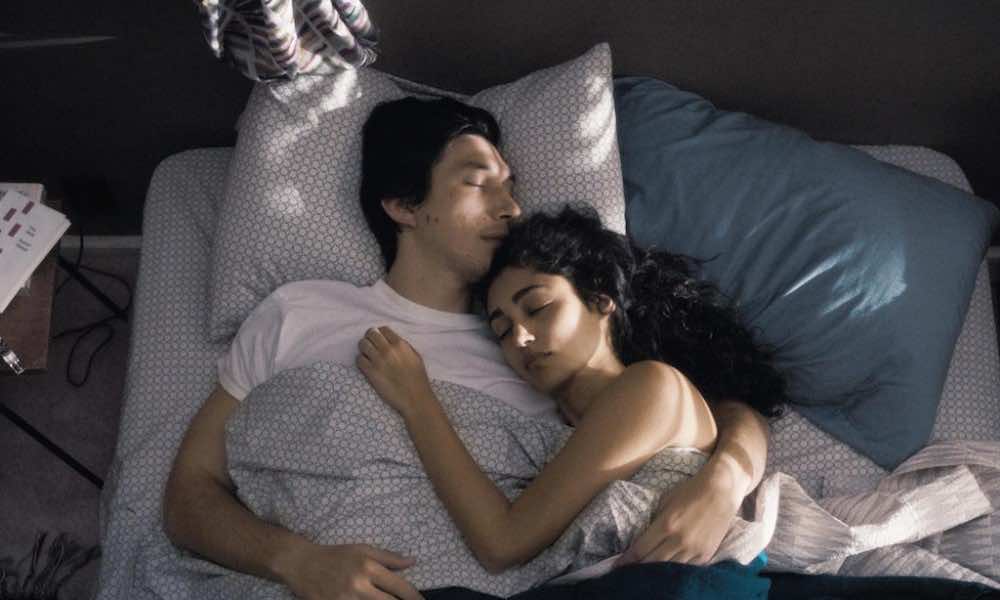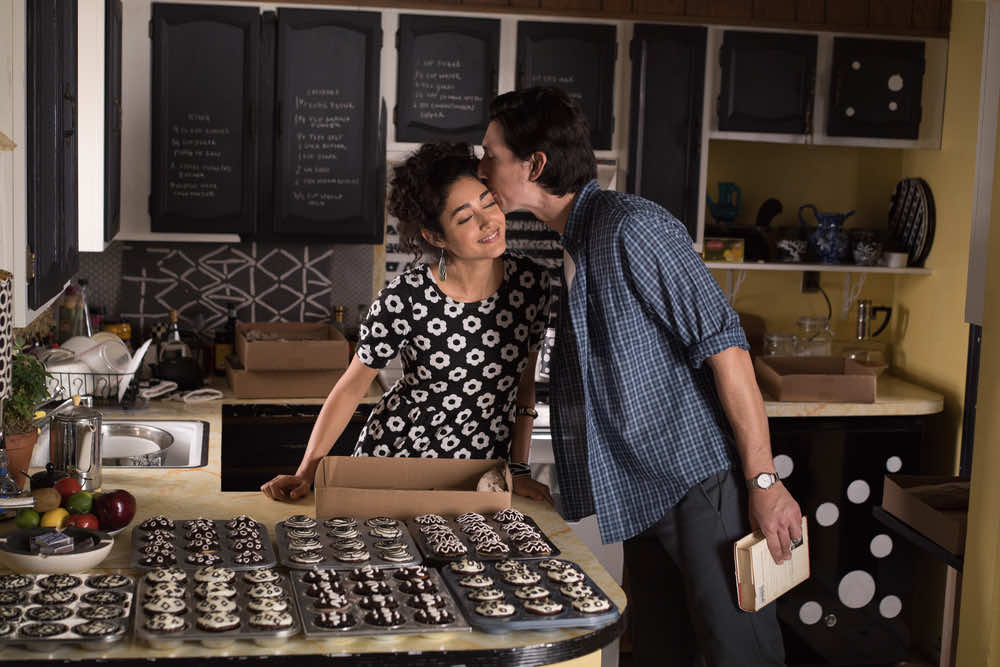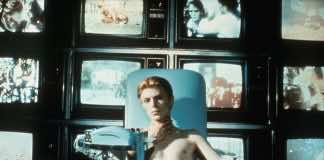
No matter what the results, legendary indie writer-director Jim Jarmusch dares to walk a fine line in cinema. Sometimes he stumbles over it and creates work so disjointed as to feel out of tune (see 2009’s The Limits of Control), but more often than not — especially lately — he arrives in places of such glory that he seems to have torn open a whole other dimension in the vocabulary of the medium (Jim Jarmusch’s ‘Only Lovers Left Alive’ presents complex, enthralling portrait of the jaded vampire). His latest, Paterson, arrives neatly formed at the level of more recent works. In fact, I don’t think I have ever seen a film capture life this vividly and magically at once. He’s created a world that reveals the connections between the quotidian and the sublime, not to mention a place where dogs may be smarter than they let on.
Paterson (Adam Driver) is a bus driver in New Jersey who drives the Paterson line. The movie covers a week in his life during which we get to know the man, who lives with his crafty, artistic and slightly crazy Persian wife Laura (Golshifteh Farahani) in a modest suburban home. A man comfortable in routine, Paterson has the power to wake before his predawn alarm clock goes off. Meanwhile, Laura half-wakes to his stirring. Eyes still closed, she shares fantastical dreams that later turn out to be prophetic. It falls into place with such ease that those not paying attention may miss the detail in the symbolism of her reveries. This little bit of earthly mysticism in the mundane is a taste of what Jarmusch is doing with this movie.

Though Paterson has a conventional job, he is far from a conventional man. He’s a poet. Paterson drafts his free verse while ambling to work through nearly empty back roads as the sun is just rising. The deep, nasally monotone of Driver repeats an awkward mantra about matches in disembodied voice over that turns out to be the start of a love poem. It reveals Paterson as an observer of the prosaic and the sublime. He will polish off the piece during his lunch break, on a park bench across a waterfall. The film’s score, a dreamy but melancholy ambient kind of music by Sqürl (essentially Jarmusch and producer Carter Logan) melds with Paterson’s voice as he writes in a notebook. As he fine tunes his poem, his face is superimposed over the slow motion tumult of the water, a symbol of chaos and beauty. The scene wouldn’t be far removed from a “Deep Thoughts by Jack Handey” skit from “Saturday Night Live” were the words not so sincere, organic and charming. Still, it’s amateurish, but that’s not the film’s point. It’s a device to note something grander and more elusive.
When Paterson returns to the bus route, he seems more introspective. Before his lunch break, he was listening in on a conversation among some riders. Now, the ambient music takes over, as Paterson continues his route while contemplating his poem. He never seems trapped in the bus. It’s shot with openness. The sun always shining in, giving the interior a buoyant glow embracing the poet. After Paterson finishes work and walks back home, he’s perplexed to find his mailbox askew, something revealed in the days that follow as part of his routine. He then walks his wife’s dog Marvin — the grouchiest bulldog ever committed to film — with whom Paterson seems to have an ambivalent relationship with. During the walk, Paterson always leaves the beast tied to a pipe outside a bar where he stops for a beer and some conversations with the bar tender and regulars before returning home to Laura.

As the weekdays unfold, we come to learn Paterson’s routine. Though you will see scenes repeated over and over, Jarmusch never forgets a third element between the day-to-day and the transcendental, as hinted by that waterfall: chaos. It’s the element that binds the two. Chaos allows for slight changes in the plot as the days repeat, and Jarmusch is keen not to present any following day with the exact same camera angles. Montage, meanwhile, reveals new objects in Paterson and Laura’s home. Though Paterson has some rather unremarkable habits, Jarmusch sometimes revisits them in quickly but patiently edited sequences of montage. As routine becomes a kind of blur in this method, it also shows how Paterson can get lost in his work, as time melts away when he immerses himself in the groove of writing. It is in this complex relationship of time and space that Jarmusch is capturing the magic of writing in a manner that’s more honest than most filmmakers have captured on film. To vary things further, there are also always fresh positions for the camera to capture Paterson’s regular acts in the days that pass. Jarmusch and Logan even take different approaches in the music to score scenes. Jazz and Persian influences appear, and never does a clear theme take form.
Beyond cinematic elements, plot-wise, Paterson meets other people. Including recurring appearances of different sets of twins that symbolically speak to the harmonious relationship in seemingly opposed ideas like “poet bus driver” and of course, mundane sublime. Dualities emerge throughout the movie. Laura is also presented as someone with a dual nature. Through his art, Paterson has an ease in making connections with strangers, including a solitary rapper working his rhymes in an empty Laudromat and a little girl with a notebook who may have more talent than Paterson. Laura, on the other hand, has a huge personality that shuts down this outgoing side of her husband. Though he seems to be an extrovert outside his relationship with Laura, she has the stronger personality when with him, and he becomes the man with an internal life — yet another polarity in characterization. Driver eases through this complex persona with great awareness and sympathy for this creative, low-key character. Laura, played with alluring mysterious charm by Farahani, spends most of her day alone, yet she is far from a hermit. In her solitude, she constantly makes new creative discoveries. She paints the white curtains with primitive black circles one day and then uses the new design on cupcakes she mass produces for a farmers market. In between, she picks up the guitar, which she also paints with the same pattern of black and white (again, duality and harmony in patterning). She also pushes him to do something more with his poems like make copies and maybe publish a booklet that he can sell. “Your beautiful poems,” she says. “They belong to the world.” Though he agrees to make the effort, he, however, never seems inspired by the notion.

The tension between this couple reveals itself in slight, subtle confrontations that never weakens their bond. There’s a beautiful tolerance between them that speaks to a deeper love that never feels overly romanticized. When there is drama, it feels so slight that you wonder if there is any conflict at all to merit a movie, but the tension has to be small so when a kind of tragic moment hits them, it has an impact. Then, when a sort of banal climax arrives, it feels like a relief and revelation. This isn’t a film about high drama not high art but the little things we all can relate with that can all leave lasting impressions on our lives.
For all its seeming platitudes, Paterson is really a film about miracles. This seemingly opposed idea of the relationship between the quotidian and the sublime is expressed in obvious symbolism, like those recurring appearances of twins during this week in Paterson’s life. But, on a slighter level, it can also be found in the existence of transcendent personal expression woven into the fabric of the everyday. From the witty meta fact that Adam Driver plays a bus driver named Paterson in a city called Paterson to his life as an anonymous poet who finds inspiration in the world around him, these things cannot exist without the other, and Jarmusch celebrates it all with equal reverence.
*Note: Paterson is on my list of top 20 films of 2016.
Paterson runs 118 minutes and is rated R. It opened in our South Florida area at the Regal South Beach and AMC Aventura on Friday, Jan. 20. For screenings in other parts of the U.S., visit the movie’s official website. Amazon Studios/Bleecker Street sent us a DVD screener for awards consideration.









